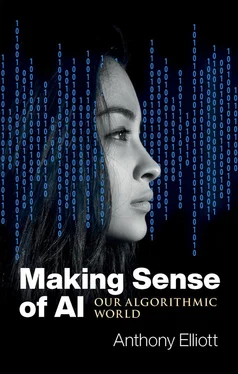The three distinct positions on AI sketched above tend to be linked to varying standpoints on technology and its impact on economy and society. According to these sceptical interpretations, the evolution of technology moves both with and against the grain of historical progress. But nothing at the level of technological innovation, it is argued, can be transformative of the economy unless it somehow takes its cue from culture and the wider, resourceful, reflective responses of human agents. For many sceptics, AI disturbs and disrupts, because the technological advances it ushers into existence have been largely unforeseen, thus taking the world by surprise. By roping AI firmly within those industrial practices associated with modernity, however, sceptics conclude that AI is unlikely to have any major or lasting impact upon the very social order of which it is the product. In short, this is a business-as-usual scenario in terms of economy and society. The three different positions recognize, to some degree, that what we witness today are significant differences between newer and older techniques of production and manufacturing. Yet sceptics reject as intrinsically flawed the idea of AI dissolving the boundary between the real world and the digital universe. It follows from this that there are also other ways in which these three sceptical positions on AI intersect. The idea of AI as creating a novel way of life – generating changes in lifestyle patterns – is viewed by sceptics as a massive public relations campaign to advance the commercial interests of tech companies. Similarly, arguments that intelligent machines can increasingly perform tasks once imagined to be purely the domain of human agents do not get much of a hearing from sceptics.
By contrast, the current of cultural experimentation that I shall call transformationalism develops a very different interpretation of AI. Transformationalists reject the claim advanced by sceptics that AI is a synonym for hype, or a cover story for tech companies. Whilst certain sensationalist aspects of the discourse of AI are not denied, the transformationalist response emphasizes that AI is an expression of deeper technological shifts in the scale of economic organization and social relations worldwide. This can be discerned, argue transformationalists, in the rise of advanced automation, supercomputers, 3D printing, Industry 4.0 and the Internet of Things. AI technologies, including robotics and advanced digital systems that deploy deep learning, neural networks, machine decision-making and pattern recognition, have given rise to an era of intelligent machines which can increasingly sense their own environments, think, learn and react in response to data. The rise of neural networks, a kind of machine learning roughly modelled on the human brain, consisting of deeply layered processing nodes, has been especially consequential for the powering up of AI-based economies and societies. Today, fewer and fewer things are removed from the impress of AI, and every phenomenon, including private life and the self, seems influenced by self-learning algorithms to its roots.
1 Sceptics show some recognition that AI is sweeping through industries, enterprises and public life, but AI is not viewed as revolutionary. On the contrary, ‘no significant change’ is the motto.
2 For many authors of a sceptical persuasion, AI as a transformative power is recast as little more than marketing hype or a myth.
3 Rather than a transformed world economy powered by AI, sceptics advance a business-as-usual model comprising technological advances on the one hand, and adaptation by the labour force on the other hand.
4 There is an emphasis upon workplace change as involving the twin forces of people and machines, employees and technology.
5 It is implicitly acknowledged that AI poses a risk to some jobs (mostly routine, unskilled work, according to sceptics), but in general the position advanced is that AI will create more jobs than it destroys.
6 There may be some spillover from AI breakthroughs that impact society, culture and everyday life – especially the globalizing forces of communication. Nonetheless, AI is primarily a technological process which principally impacts the economy in limited and partial ways.
7 For many of a sceptical persuasion, traditional economic power is paramount and the actions of national societies are important too. Accordingly, the globalizing dimensions of AI are treated as contingent on these economic and national state factors.
Central to this transformationalist perspective is an emphasis on the social relations impacted by AI. That is to say, the technologies associated with AI are understood to reshape not only institutions and organizations but also identities and intimacies. Another way of making this point is to say that the AI revolution is as much about entertainment as it is about the economy, as much about meaning and morality as it is about money and manufacturing. For lifestyle change is likely to be of key importance in the spheres of both professional and personal life when assessing the impacts of AI, or so argue transformationalists. As Erik Brynjolfsson and Andrew McAfee write of these massive changes in The Second Machine Age : ‘Computers started diagnosing diseases, listening and speaking to us, and writing high-quality prose, while robots started scurrying around warehouses and driving cars with minimal or no guidance.’ 7Brynjolfsson and McAfee capture well the idea that digital transformation is not only about the economy, industry and corporate life, but crucially also about sociality, everyday life and power. The advance of AI is, in a word, generative . The digital revolution creates different kinds of work and different sorts of skills and gives rise to different ways of living from those of even the very recent past.
Transformationalists question the idea that economy and society can be adequately grasped from the business-as-usual perspective advanced by sceptics. For the extensive penetration of the global economy by digital forces has fundamentally altered its operations and dynamics. Transformationalists generally underscore the essential significance of the digital revolution, an historic moment in the worldwide transformation of manufacture and services. This involves locating contemporary patterns of globalization within the new technological revolution, and a dazzling variety of terms has been coined to capture these momentous shifts – including ‘Industry 4.0’, ‘digital capitalism’, ‘algorithmic governmentality’, ‘bot economy’ and ‘automated society’. Three aspects of change tend to be emphasized in the transformationalist literature: the radical transformation of manufacture and services, of consumption and citizenship, and of public policy. In transforming both the conditions and consequences of economy and society, according to this argument, AI, robotics and other forms of automation have revolutionized corporate life and businesses across the world. Advances in machine learning algorithms and big data in particular have underpinned extraordinary innovations in the manufacturing of goods and services as well as the emergence of new industries, and consequently jobs and employment have come under assault as never before. The impact of smart software, and of social media more generally, has significantly transformed the consumer economy itself. At the same time, these unparalleled technological innovations directly impact upon issues of ethics and governance. Recognizing how closely the impact of AI on jobs and public policy are intertwined, governments worldwide have sought to introduce a raft of measures geared towards enabling robust engagement with the digital revolution.
Читать дальше

![Джейн Остин - Sense and Sensibility [С англо-русским словарем]](/books/26612/dzhejn-ostin-sense-and-sensibility-s-anglo-thumb.webp)










